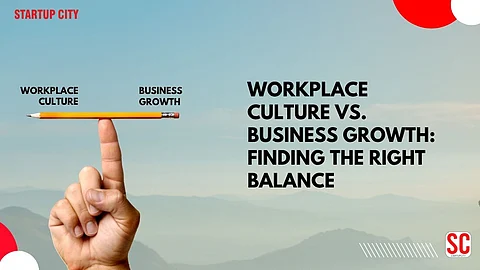

You’ve just secured your next round of funding. Growth targets are sky-high. Investors are watching. But as you push harder, you start noticing cracks — your top talent is burning out, team morale is shaky, and people whisper about leaving.
Sound familiar?
In my experience, this is where the rubber meets the road. Balancing workplace culture with business growth isn’t just a leadership challenge — it’s the silent killer of scaling startups if not handled wisely.
Let me show you how to avoid that fate.
On paper, culture and growth should go hand-in-hand. But in real life, they’re often at odds. Growth demands speed, hustle, outcomes. Culture thrives on empathy, connection, and trust.
Here’s the tension:
Growth pushes you to hire fast; culture needs careful onboarding.
Growth calls for data and deadlines; culture calls for purpose and belonging.
Growth measures performance; culture measures people.
It’s no wonder so many leaders feel torn. Do you scale fast or protect your people?
Here’s the truth: You don’t have to choose. You just have to balance.
Let’s talk facts. According to a report by Deloitte, 94% of executives and 88% of employees believe a distinct workplace culture is important to business success. Yet, only 19% say their culture is widely upheld.
What does that mean for us?
It means culture is easy to ignore during hyper-growth, but the cost is massive:
High attrition: Losing your best people mid-growth derails momentum.
Low morale: Toxic environments kill innovation and ownership.
Brand damage: Bad Glassdoor reviews? Say goodbye to top talent.
Just ask Uber during its early hyper-growth phase — aggressive expansion without culture alignment led to PR disasters, lawsuits, and a complete leadership shake-up.
I’ve seen this in startups across India and globally — a rocket-speed growth trajectory followed by an equally rapid crash. Why? Because culture is the infrastructure that holds growth together.
Think of it like this:
Culture is the software that runs your team.
Growth is the scaling of users.
If the software is buggy, scaling only multiplies the problems.
So instead of pitting workplace culture vs. business growth, the real challenge is aligning them.
Let’s break down how.
Start with clarity.
Before chasing growth, get crystal clear on what your company stands for.
Ask yourself:
What are our non-negotiable values?
What kind of behaviors do we reward?
What do we absolutely NOT tolerate?
Write it down. Make it visible. Bake it into hiring, reviews, and team rituals.
Example: At Zappos, customer service wasn’t just a department; it was the culture. Even during massive expansion, every new hire went through 4 weeks of cultural onboarding.
Fast growth often means hiring at scale. But hiring only for skills is a trap.
Here’s the secret: Hire for culture fit to protect your identity. Hire for culture add to evolve with scale.
Ask:
Will this person thrive in our values?
What new perspective will they bring?
Pro Tip: Include a cultural interviewer in your hiring panel — someone whose only job is to assess values alignment.
During scale, your team will feel stretched. Uncertainty will creep in. This is when communication becomes your superpower.
Host weekly all-hands — even if it’s just 5 people.
Share transparent updates about wins, failures, and roadmaps.
Celebrate small victories publicly.
In my experience, the best-performing teams are not the most talented — they’re the most aligned.
Growth can make founders anxious. You want things perfect. But control kills culture.
Instead of micromanaging, build systems of trust:
Clear KPIs
Freedom to fail
Ownership over outcomes
Inspiring Quote:
“Culture is what happens when the boss isn’t in the room.” — Patty McCord, former Chief Talent Officer at Netflix
Culture isn’t what you say on LinkedIn. It’s what your team feels every day.
Make it real with rituals:
Weekly shout-outs for value-based behavior
“Culture champions” in each department
Monthly wellness check-ins
Annual team retreats — even virtual
Internal Article Suggestion:
5 Low-Cost Team-Building Rituals for Bootstrapped Startups
As a founder, you are the culture. What you tolerate, you endorse. What you celebrate, you amplify.
So when pressure hits:
Don’t skip the one-on-ones.
Don’t delay feedback.
Don’t ghost your team.
Your consistency in chaos sets the tone.
What gets measured gets managed. So why not track culture?
Use tools like:
Pulse surveys (eNPS)
Engagement scores
Culture audits during quarterly reviews
Tie these to business metrics:
Retention
Productivity
Innovation rates
If your team is thriving, your business will too.
Let me leave you with this:
Culture isn’t a soft skill — it’s a strategic asset.
It doesn’t slow down growth. It enables it.
When your team feels safe, valued, and inspired, they’ll go the extra mile. They’ll build things you couldn’t dream of. They’ll stay when others leave.
So don’t choose between culture and growth.
Build both. Balance both. And watch your business soar.
Are you scaling at the cost of your team’s wellbeing?
What values do you want your startup to be known for?
What culture rituals can you implement this month?